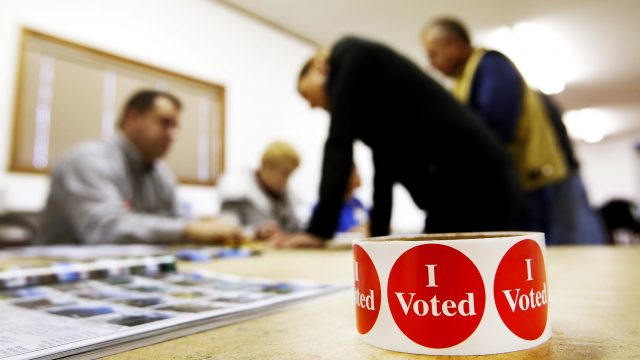Secretary Of State: You Can't Vote For More Than One Party's Candidates In June

Stickers are available after voting as seen Tuesday, Nov. 4, 2014, at the Oakport Township polling site. Dave Wallis / The Forum
The June primary is coming up faster than you realize. In fact, as I write this, there have been 24,222 absentee and vote-by-mail ballots sent out by election officials for the June primary, and 3,382 of those ballots have been cast already.
There are still tens of thousands of ballots yet to be cast, but as North Dakotans consider which candidates they’ll be voting for Secretary of State Al Jaeger has a friendly reminder.
You can’t vote for more than one party’s candidates on the June primary.
“Under state law, electors may only mark votes for candidates listed in the column designated for one of the political parties,” Jaeger states in a press release sent out today. “In the political party primary, if an elector casts a vote for candidates in the column of more than one political party, it is considered a crossover vote and no votes cast by the elector in the political primary portion of the ballot will be counted.”
[mks_pullquote align=”right” width=”300″ size=”24″ bg_color=”#ffffff” txt_color=”#000000″]”Under state law, electors may only mark votes for candidates listed in the column designated for one of the political parties,” Jaeger states in a press release sent out today. “In the political party primary, if an elector casts a vote for candidates in the column of more than one political party, it is considered a crossover vote and no votes cast by the elector in the political primary portion of the ballot will be counted.”[/mks_pullquote]
This is an important point because crossover votes – specifically Democrats, who have no competitive races on their ballot, voting in competitive Republican races – may be an issue in the gubernatorial race.
The conventional wisdom is that Fargo businessman Doug Burgum, who has spent a lot of money to brand himself as a conservative but is perceived by some to be a bit further to the left on both fiscal and social issues, may need Democrats to vote as Republicans in June to be his opponent Attorney General Wayne Stenehjem.
But the problem with that strategy – if that’s even what it is – is that it’s hard to organize Democrats to vote as Republicans en masse if nobody tells them to do that. The Burgum campaign can’t do it. They’d lose as many or more Republican votes if they did so. And the Democrats aren’t going to encourage the party faithful to start voting Republican.
And if voters spontaneously decide to crossover on their own? Well there’s the risk that they won’t realize that voting for more than one party’s candidates will disqualify their ballot entirely.
Back in 2011 state Rep. Corey Mock, a Democrat fresh off an unsuccessful challenge to Jaeger on the statewide ballot, proposed legislation to allow this sort of crossover voting. He was unsuccessful, obviously, and that’s as it should be.
The primary ballot is about selecting who will represent the various political parties – Democrats, Republicans, Libertarians, etc. – in the general election. In other words, it’s about nominating a party’s candidates. It’s one thing to vote bipartisan in the general election. Many people do, and that’s just fine. But the primary should be about Republicans choosing their candidates, Democrats choosing their candidates, etc., etc.
Here’s the full press release from Jaeger’s office:
[scribd id=312798523 key=key-xiBWQkPRlbbNASYStask mode=scroll]




